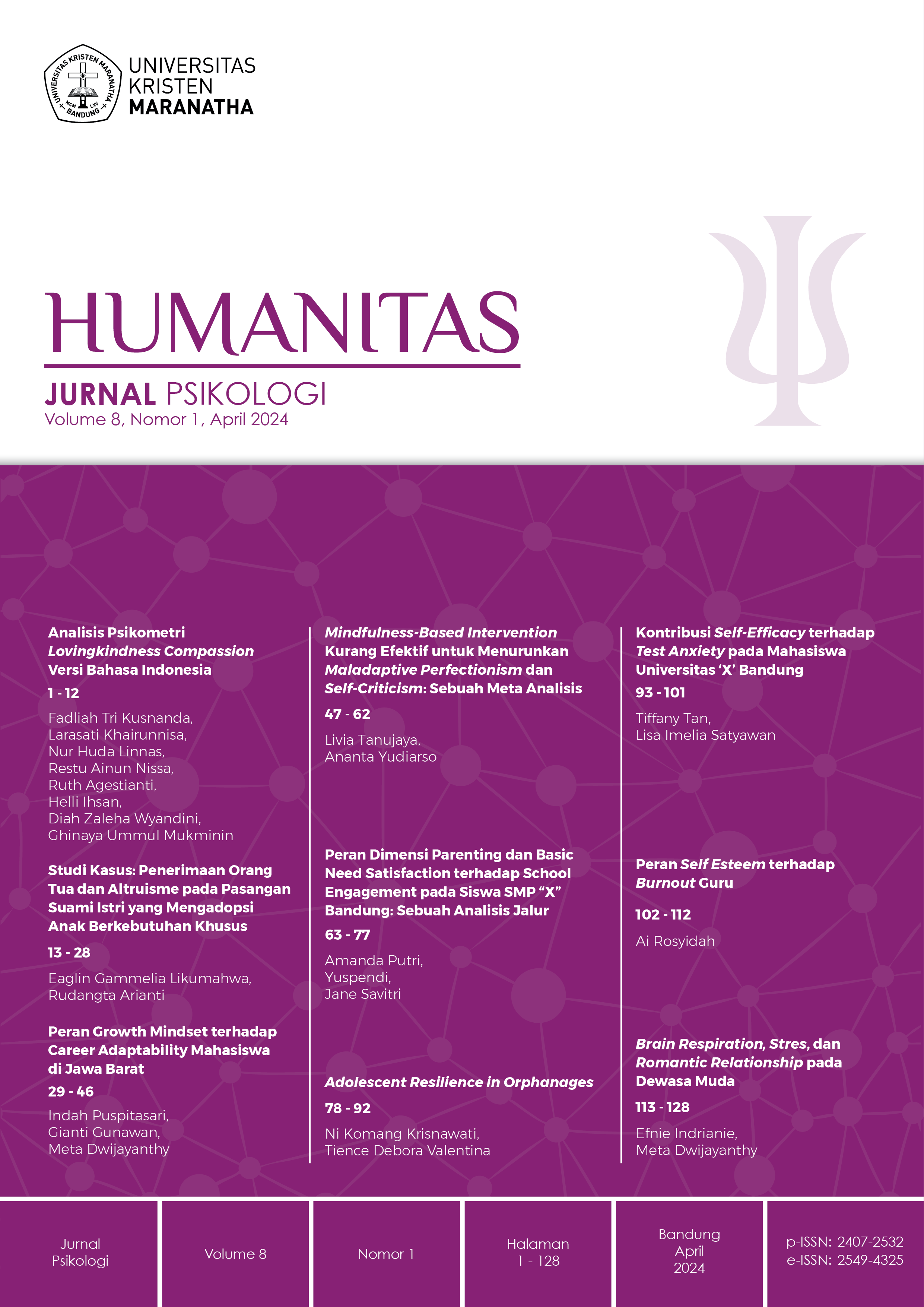The Role of Parenting Dimensions on School Engagement through Basic Need Satisfaction among Junior High School Students in 'X' Bandung
Main Article Content
Abstract
Downloads
Article Details

This work is licensed under a Creative Commons Attribution-NonCommercial 4.0 International License.
References
Abidin, F. A., Joefiani, P., Koesma, R. E., & Siregar, J. (2019). Parental Structure and Autonomy Support: Keys to Satisfy Adolescent’s Basic Psychological Needs. Opción: Revista de Ciencias Humanas y Sociales, (22), 1257-1274.
Appleton, J. J., Christenson, S. L., & Furlong, M. J. (2008). Student Engagement with School: Critical Conceptual and Methodological Issues of the Construct. Psychology in the Schools, 45(5), 369–386. https://doi.org/10.1002/pits.20303
Branje, S., De Moor, E. L., Spitzer, J., & Becht, A. I. (2021). Dynamics of Identity Development in Adolescence: A Decade in Review. Journal of Research on Adolescence, 31(4), 908-927.https://doi.org/10.1111/jora.12678
Costa, S., Gugliandolo, M. C., Barberis, N., Cuzzocrea, F., & Liga, F. (2019). Antecedents and Consequences of Parental Psychological Control and Autonomy Support: The Role of Psychological Basic Needs. Journal of Social and Personal Relationships, 36(4), 1168-1189. https://doi.org/10.1177/0265407518756778
Dancey, Christine P. dan Reidy. 2011. Statistics Without Maths for Psychology (Fifth Edition). Edinburgh Gate: Pearson Education Limited
Day, E., & Dotterer, A. M. (2018). Parental Involvement and Adolescent Academic Outcomes: Exploring Differences in Beneficial Strategies Across Racial/Ethnic Groups. Journal of Youth and Adolescence, 47, 1332-1349. https://doi.org/10.1007/s10964-018-0853-2
Fredricks, J. A., Blumenfeld, P. C., & Paris, A. H. (2004). School Engagement: Potential of the Concept, State of the Evidence. Review of Educational Research, 74(1), 59–109. https://doi.org/10.3102/00346543074001059
Fredricks, J. A., Ye, F., Wang, M. T., & Brauer, S. (2019). Profiles of School Disengagement: Not all Disengaged Students are Alike. Handbook of Student Engagement Interventions. Academic Press.
Griffith, S. F., & Grolnick, W. S. (2014). Parenting in Caribbean Families: A Look at Parental Control, Structure, and Autonomy Support. Journal of Black Psychology, 40(2), 166-190. https://doi.org/10.1177/0095798412475085
Grolnick, W.S. 2003. The Psychology of Parental Control: How Well-Meant Parenting Backfires. Mahwah, NJ: Erlbaum.
Grolnick, W.S. dan Farkas, M.S. 2010. Examining the Components and Concomitants of Parental Structure in the Academic Domain. Springer Science and Business Media.
Grolnick, W. S., Friendly, R. W., & Bellas, V. M. (2009). Parenting and Children’s Motivation at School. Dalam K. R. Wentzel & D. B. Miele (Ed.), Handbook of Motivation at School. Routledge.
Grolnick, W. S., Levitt, M. R., Caruso, A. J., & Lerner, R. E. (2021). Effectiveness of a Brief Preventive Parenting Intervention Based in Self-Determination Theory. Journal of Child and Family Studies, 30(4), 905–920. https://doi.org/10.1007/s10826-021-01908-4
Grolnick dan Slowiaczek. (1994). Parent’s Involvement in Their Children’s Schooling: A Multidimensional Conceptualization and Motivational Model. Child Development, No. 65: 237-252. https://doi.org/10.1111/j.1467-8624.1994.tb00747.x
Hair Jr., Black, Babin dan Anderson. (2014). Pearson New International Edition: Multivariate Data Analysis (Seventh Edition). Edinburgh Gate: Pearson Education Limited.
Jiang, R., Fan, R., Zhang, Y., & Li, Y. (2022). Understanding the Serial Mediating Effects of Career Adaptability and Career Decision-making Self-efficacy between Parental Autonomy Support and Academic Engagement in Chinese Secondary Vocational Students. Frontiers in Psychology, 13, 953550. https://doi.org/10.3389/fpsyg.2022.953550
Lawrence, K. C., & Fakuade, O. V. (2021). Parental Involvement, Learning Participation and Online Learning Commitment of Adolescent Learners During the COVID-19 Lockdown. Research in Learning Technology, 29. https://doi.org/10.25304/rlt.v29.2544
Lerner, R. E., Grolnick, W. S., Caruso, A. J., & Levitt, M. R. (2022). Parental Involvement and Children’s Academics: The Roles of Autonomy Support and Parents’ Motivation for Involvement. Contemporary Educational Psychology, 68, 102039. https://doi.org/10.1016/j.cedpsych.2021.102039
Liu, K., Zhao, Y., Li, M., Li, W., & Yang, Y. (2022). Parents’ Perception or Children’s Perception? Parental Involvement and Student Engagement in Chinese Middle Schools. Frontiers in Psychology, 13, 977678. https://doi.org/10.3389/fpsyg.2022.977678
Permadi, Y. N., Savitri, J., Anggrainy, D., & Pandin, M. (2017). Peran Parental Structure terhadap Basic Need Satisfaction pada Siswa Kelas IV-VI di Sekolah Dasar “X” Bandung. Humanitas, 1(3), 173–182. https://doi.org/https://doi.org/10.28932/humanitas.v1i3.755
Permendiknas. (2006). Peraturan Menteri Pendidikan Nasional No.23 Tahun 2006 tentang Standar Kompetensi Lulusan untuk Satuan Pendidikan Dasar dan Menengah. Jakarta: Depdiknas.
Pomerantz, E. M., Grolnick, W. S., & Price, C. E. (2005). The Role of Parents in How Children Approach Achievement: A Dynamic Process Perspective. Dalam A. J. Elliot & C. S. Dweck (Ed.), Handbook of Competence and Motivation. Guilford Publications.
Riduwan & Kuncoro. (2014). Cara Mudah Menggunakan dan Memaknai Path Analysis (Analisis Jalur). Bandung: Alfabeta.
Ryan, R. M., & Deci, E. L. (2017). Self Determination Theory: Basic Psychological Needs in Motivation, Development, and Wellness. The Guilford Press.
Ryan, R. M., & Deci, E. L. (2020). Intrinsic and Extrinsic Motivation from a Self-Determination Theory Perspective: Definitions, Theory, Practices, and Future Directions. Contemporary Educational Psychology, 61. https://doi.org/10.1016/j.cedpsych.2020.101860
Santrock, J. W. (2018). Adolescence (17 ed.). McGraw-Hill Education.
Savitri, J., Setyono, I. L., Cahyadi, S., & Srisayekti, W. (2018). The role of parental involvement in student’s academic achievement through basic needs satisfaction and school engagement: Construct development. Diversity in Unity: Perspectives from Psychology and Behavioral Sciences.
Sireno, S., Papa, F., Nocito, M., & Meneghini, I. (2020). Basic Psychological Needs’ Antecedents and Outcomes: A Contexts Analysis from a Self-Determination Theory Perspective. Journal of Clinical and Developmental Psychology, 2(3), 1–13. https://doi.org/10.6092/2612-4033/0110-2852
Sugeng, B. (2022). Fundamental Metodologi Penelitian Kuantitatif (Eksplanatif). Deepublish.
Talley, A. E., Kocum, L., Schlegel, R. J., Molix, L., & Bettencourt, A. (2012). Social Roles, Basic Need Satisfaction, and Psychological Health: The Central Role of Competence. Personality and Social Psychology Bulletin, 38, 155–173. https://doi.org/10.1177/0146167211432762
Wang, Y., Tian, L., & Huebner, E. S. (2019). Basic Psychological Needs Satisfaction at School, Behavioral School Engagement, and Academic Achievement: Longitudinal Reciprocal Relations among Elementary School Students. Contemporary Educational Psychology, 56, 130-139.https://doi.org/10.1016/j.cedpsych.2019.01.003
Won, S., & Shirley, L. Y. (2018). Relations of Perceived Parental Autonomy Support and Control with Adolescents' Academic Time Management and Procrastination. Learning and Individual Differences, 61, 205-215. https://doi.org/10.1016/j.lindif.2017.12.001

